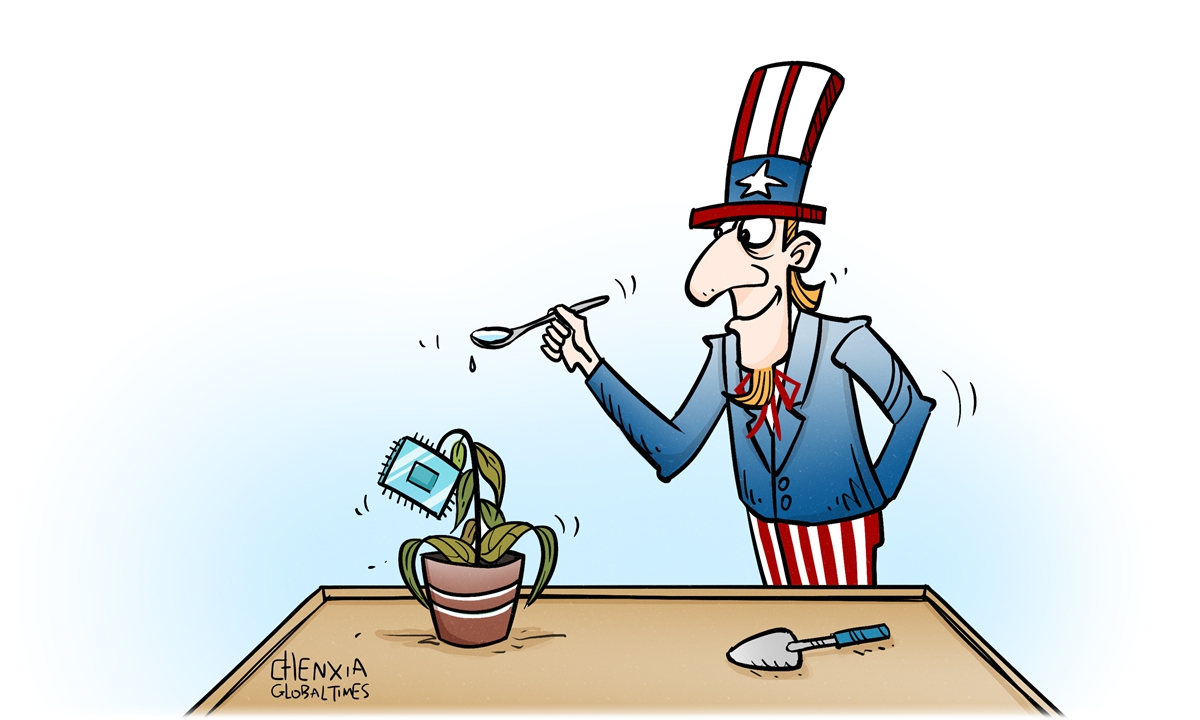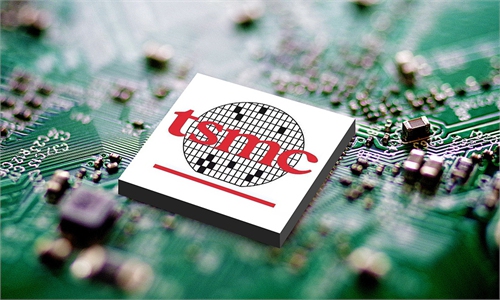
Illustration: Chen Xia/Global Times
As the US Department of Commerce on Wednesday issued a statement to celebrate the first anniversary of the so-called CHIPS and Science Act, which was signed into law by US President Joe Biden, financial network CNBC reported that semiconductor manufacturers in the US are still waiting for the subsidies the act promised.The statement of the US Commerce Department said that there have been more than 460 statements of interest for manufacturing incentives from US companies, and only $39 billion in manufacturing incentives in the $52.7 billion package, which means that even if there are no new applicants, the average incentive fund per company is just under $100 million.
The CHIPS and Science Act initially aimed to reshore the semiconductor supply chain, but so far, no funding set aside by the legislation has been awarded to any US semiconductor maker, including applicants such as Integra, Intel and SkyWater, according to CNBC.
The fact that the measure delivers less than claimed and its implementation is inefficient should wake up any companies that still have illusions about US subsidies. Even if the entire $39 billion in incentives is handed out, it will have limited impact on the revitalization of semiconductor manufacturing in the US.
One year later, it has become crystal clear that the US CHIPS and Science Act is nothing but a hegemonic tool of protectionism and barrier to free trade. However, moves going against economic and market laws are doomed to fail in terms of cracking down on China's chip sector and revitalizing that of the US.
For companies urged by the US government to build semiconductor manufacturing plants in the US, a failure to get government subsidies may be the least of their challenges.
For instance, as it is difficult to recruit needed local staff with professional skills, Taiwan Semiconductor Manufacturing Co (TSMC)'s progress in setting up a chip factory in the US state of Arizona has fallen behind the original plan. After announcing that mass production would be postponed from 2024 to 2025, the company recently decided to send more employees from China's Taiwan region to the US to speed up the progress, but the move has been criticized by the leader of the Arizona labor union as an excuse to introduce lower-paid foreign workers.
When the Biden administration passed the CHIPS and Science Act one year ago to promote the reshoring of chip manufacturing to the US, some media reports said that Asian semiconductor giants such as TSMC and Samsung would benefit from it. However, the recent news of TSMC's difficulty in starting production showed that the US did not plan to provide enough support to companies like TSMC.
While the intensifying US suppression of China's semiconductor sector has increasingly caused disruptions in international supply chains and caused more losses to US semiconductor manufacturers, rising chip production capacity in China has made the Chinese market less dependent on US chip supplies, contrary to US expectations.
Thanks to the determination to develop its own chipmaking industrial chain, China's production capacity in terms of lower-end chips has grown rapidly. In the first five months of this year, domestic chip output reached 140 billion units, chip imports by volume declined by about 20 percent year-on-year in the first five months, according to media reports.
During a recent panel discussion at the American Enterprise Institute, US Commerce Secretary Gina Raimondo claimed that "the amount of money that China is pouring into subsidizing what will be an excess capacity of mature chips and legacy chips." Earlier, Raimondo warned of a glut of semiconductor chips due to "China's aggressive industry subsidies," according to US media reports.
The increasing groundless slander and attacks by the US against Chinese semiconductors have fully exposed Washington's growing anxiety and fear, because the chip war it launched did not go as expected, and efforts to maintain chip hegemony are increasingly backfiring on the US semiconductor industry. Deliberate US moves to disrupt the established global semiconductor manufacturing supply chain seem to have increasingly undercut its own semiconductor industry.
It's ironic that protectionist US moves like the CHIPS and Science Act have put the US on the opposite side of the free trade rules it once advocated. As the subsidies promised by the US to reshore chip manufacturing seem increasingly to have become a joke, the US might realize that economic coercion and chip hegemony moves are counterproductive. China's semiconductor sector will progress steadily, despite the US' arbitrary disruption of global semiconductor cooperation.
The author is a reporter with the Global Times. bizopinion@globaltimes.com.cn



